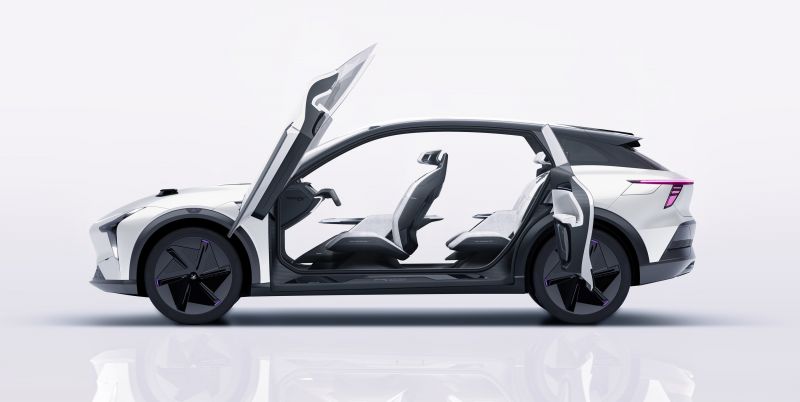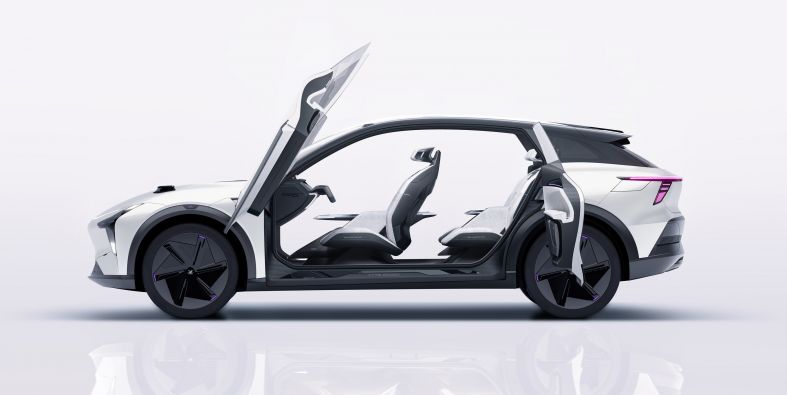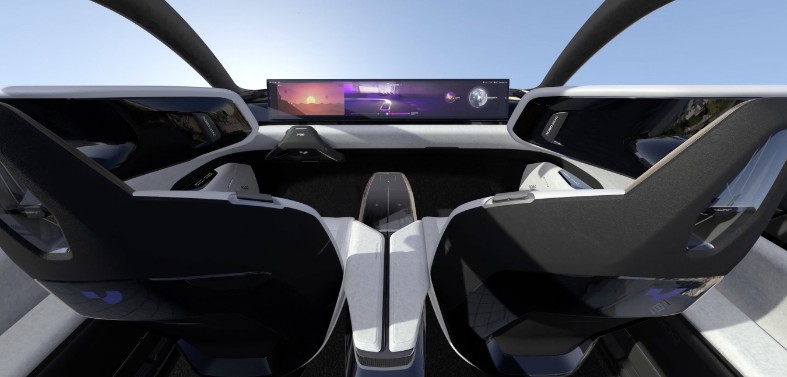New Intelligent EV Company JiDU Reveals its Revolutionary Concept Production 'Robocar'
【Summary】JiDU, the new intelligent electric vehicle (EV) company backed by China’s internet giant Baidu Inc and Volvo Cars’ parent company Zhejiang Geely Holding Group ("Geely"), unveiled its concept production “robocar” on Wednesday. The company says the futuristic vehicle is set to “revolutionize the automobile industry”, leading the way to an intelligent car era powered by advanced artificial intelligence.

JiDU, the new intelligent electric vehicle (EV) company backed by China's internet giant Baidu Inc. and Volvo Cars' parent company Zhejiang Geely Holding Group ("Geely"), unveiled its concept production "robocar" on Wednesday in one of the most unique reveals ever in the metaverse, which is fitting for such an advanced electric vehicle.
The concept production robocar is dubbed "ROBO-01". JiDu says the futuristic vehicle is set to "revolutionize the automobile industry", leading the way to an intelligent car era powered by advanced artificial intelligence (AI).
The robocar was unveiled at JIDU's first-ever branded event called "ROBODAY", held in Baidu's "XiRang metaverse" virtual environment. Baidu's XiRang metaverse is also known as the "Land of Hope".
JiDU's parent company Baidu is often referred to as the "Google of China''.
The virtual world is accessible as an application on computers, smartphones, and wearable devices. Baidu allows users to login and create a custom avatar and explore the virtual environment and engage with other users.
The XiRang metaverse can support up to 100,000 users interacting in real-time. At the unveiling, the first-ever digital human car owner, named Xijiajia, drove and interacted with JiDU ROBO-01.
As a new electric vehicle company in a highly competitive industry, JiDU's mission is to create and design a human-centric, smart robotic vehicle with AI-powered human-machine interaction technology.
ROBO-01 resembles a compact SUV and features a unique look. The design of the main and passenger butterfly wing doors, rear pair of doors and non-marking side windows is also one-of-its-kind in the industry, which gives the EV its sleek and dynamic robot-like car body. The EV also features an active liftable rear wing called a "ROBOWing".

The cabin of the concept car, which is 90% similar to the production model, features a U-shaped folding steering wheel, 3D borderless integrated ultra-clear screen, 3D human-machine co-driving map, full-scene voice inside and outside the car, millisecond voice response and offline intelligent voice assistant.
The U-shaped steering wheel is designed to maximize visibility of the dashboard screen. Since the robocar is powered by steer-by-wire technology, the steering wheel can be folded and hidden away as needed to free up cabin space.
Inside the cabin, the ROBO-01 uses an active deformable structure design, 3D borderless one-piece large screen, zero-gravity seating, AI pixel lights and dual max-computing chips to support its AI functions and autonomous driving.
The spacecraft-inspired zero-gravity seats are lightweight and breathable and wrap around the occupant. The seats also include a unique "swan neck" headrest design with an adaptive adjustment function to increase comfort.
In addition, The futuristic EV is also free of door handles, indicator levers and other physical control keys. JiDu says this makes the human-vehicle interaction experience even more natural and seamless.
The 3D borderless HD screen in the cabin is designed to run horizontally across the entire dashboard, which is similar to what Mercedes-Benz is offering the new EQS electric sedan. The front seat passengers will experience an immersive audio and visual experience.
Advanced Autonomous Driving Capabilities Powered by Baidu's Apollo
JIDU is the only automaker in the industry that uses Baidu's full-stack Apollo autonomous driving technology being developed under its open Apollo ecosystem.
Apollo's advanced autonomous driving capabilities have been extensively applied in the JiDU robocar, with 27 million kilometers of testing on public roads in China in more than 30 cities. The Apollo autonomous driving technology is continuously improved to better cope with complex urban driving environments.
The robocar's advanced autonomous driving capabilities are based on a unique "trainable" functionality and JIDU robocar neural JET (JIDU Evolving Technology). It supports a high-level autonomous driving system with full redundancy of all critical systems.
The vehicle OS is based on JIDU's in-house developed cabin-driving fusion technology architecture, for "true redundancy" of all autonomous driving systems.
The ROBO-01 is equipped with dual NVIDIA DRIVE Orin X processors and 31 external sensors, including 2 LiDAR units, 5 millimeter-level wave radars, 12 ultrasonic radars and 12 cameras.
The full stack autonomous driving system was successfully tested and run on the JIDU SIMUCar (software integrated simulation vehicle), which verified the safety and stability of the advanced autonomous driving system ahead of mass production.
The ROBO-01 is capable of point-to-point advanced autonomous driving without human intervention (SAE level 4). It can safely handle high-speed highways, busy urban roads and urban parking situations. The system was tested and verified to handle unprotected left turn, traffic light recognition, obstacle avoidance and freeway on/off ramps.
Unlike Tesla's Full Self Driving (FSD) package, users will be able to access these and other advanced autonomous driving functions from the moment they begin driving.
The ROBO-01 also comes equipped with a set of fully adjustable structures, including front hood collapsible LiDAR.
The collapsible LiDAR was designed by JIDU to enhance the safety and stability of the intelligent driving system while offering improved sensing capability for autonomous driving. The LiDAR unit itself can be collapsed by AI intervention before a crash occurs, thus improving safety. JIDU recently was awarded a Chinese national patent for its collapsible lidar technology.
"Having transitioned from the "Fuel Car 1.0 Era" to the "Electric Car 2.0 Era", the automotive industry is today entering the "Intelligent Car 3.0 Era" with JIDU leading the emergence of a new generation of automotive products," said Xia Yiping, CEO of JIDU. "The Intelligent Car 3.0 Era is the era of robocars," "The transition to this new era is marked by the shift of driving power from humans to AI, with robocars ultimately achieving self-generating progress led by AI."
According to JiDU, the auto industry in the 3.0 era will see a seismic shift to electric power and a revolution in vehicle design. The goal of the JiDU ROBO-01 is to realize a fully autonomous and intelligent transportation experience that requires no human intervention.
When combined with AI, the JIDU robocar is intended to meet users' needs for intelligent travel, supported by an in-car intelligent assistance and intelligent cabin. The ROBO-01's intelligent voice assistant that responds to passenger commands in just milliseconds.
The in-cabin assistant used edge processing, so its doesn't rely on network signals and the cloud to fulfill requests. It also features multi-modal "human-like" interaction capabilities, such as visual perception, voice recognition and lip capture, allowing for "natural and smooth" voice communication between user and the vehicle.
JIDU is also the first automaker to launch the 4th generation of Qualcomm's Snapdragon Automotive Cockpit Platform, which renders immersive 3D graphics on the HD windscreen dashboard display. It's combined with an intelligent cockpit and vehicle software jointly developed by JiDU and Baidu.

In January, JIDU announced that it has closed on $400 million in Series A financing. The funding round was backed by Baidu and Geely.
In April of last year, JiDU's CEO Xia Yiping told Reuters that the company aims to invest 50 billion yuan ($7.7 billion) into producing autonomous cars over the next five years that fully meet the needs of advanced autonomous driving.
The company plans to lead the mobility revolution in China in the intelligent era. Based on features of the ROBO-01 concept, JiDU is well on its way of meeting its goal.
JIDU plans to officially launch a limited version of its first production model this fall. The company will also unveil the design of its second production model at this year's Guangzhou Auto Show.
JiDU's parent company Baidu continues its own work on autonomous driving. At Baidu's annual "Baudi World 2021" conference held in August 2021, the tech giant shared its progress on AI and autonomous driving.
Among the highlights of the event, Baidu co-founder and CEO Robin Li unveiled his vision for mobility of the future in the form of a futuristic "robocar", which he said was designed to make autonomous vehicles more accessible to the broader public.
Baidu's own robocar features automated gull-wing doors and a transparent glass roof to make the interior feel more spacious for passengers. Other features include voice and facial recognition and advanced AI technology. The vehicle can analyze the internal and external surroundings and make predictive suggestions to proactively serve the needs of its passengers, Li said.
Li believes that vehicles in the future EVs will be more like "intelligent robots" rather than passenger vehicles. He predicts that these vehicles will "move, communicate and learn" using advanced AI.
-


Ford is Testing a New Robotic Charging Station to Assist Drivers of EVs With Disabilities
-


Ford Raises the Prices of the F-150 Lightning Electric Pickup Due to Rising Raw Material Costs
-


The BMW 7-Series to Feature HD Live Maps From HERE Technologies for Hands-Free Highway Driving in North America at Speeds up to 80 MPH
-


AutoX to Use the 'Eyeonic Vision Sensor' from California-based SiLC Technologies for its Robotaxi Fleet in China
-


LG Develops ‘Invisible’ Speaker Sound Technology That Could Revolutionize In-Vehicle Audio
-


Researchers at South Korea’s Chung-Ang University Develop a ‘Meta-Reinforcement’ Machine Learning Algorithm for Traffic Lights to Improve Vehicle Throughput
-


Zeekr’s New 009 Electric Passenger Van is the World’s First EV to Feature CATL’s Advanced ‘Qilin’ Battery With a Range of 510 Miles
-


Redwood Materials is Building an Electric Vehicle Battery Recycling Facility in South Carolina
- Mazda Outlines Plans to Invest $10.6 Billion in Electric and Hybrid Vehicle Development Through 2030
- Siemens Invests $25 Million in Wireless Charging Company WiTricity to Develop Interoperable Standards for Cable-free EV Charging
- Electric Truck Maker Rivian Opens the First Fast Chargers in Colorado for its Nationwide ‘Adventure Network’
- Biden Administration Announces New Standards to Make EV Chargers More Accessible
- $12,500 Federal EV Tax Credit Proposal Reportedly Dropped
- California DMV Accuses Tesla of Making False Claims About its Driver-Assist Systems
- NHTSA Upgrades Tesla's Autopilot Investigation to 'Engineering Analysis'
- China’s Geely Launches the First of 9 Low Earth Orbit Satellites That Will Help Guide its Autonomous Cars
- SiLC Technologies Launches its Eyeonic Vision System, a LiDAR Sensor That Can Identify Objects up to 1 Kilometer Away
- Automotive Supplier MAHLE Developed a Superior Continuous Torque (SCT) Electric Vehicle Motor That Can Run ‘Indefinitely’











 About Us
About Us Contact Us
Contact Us Careers
Careers